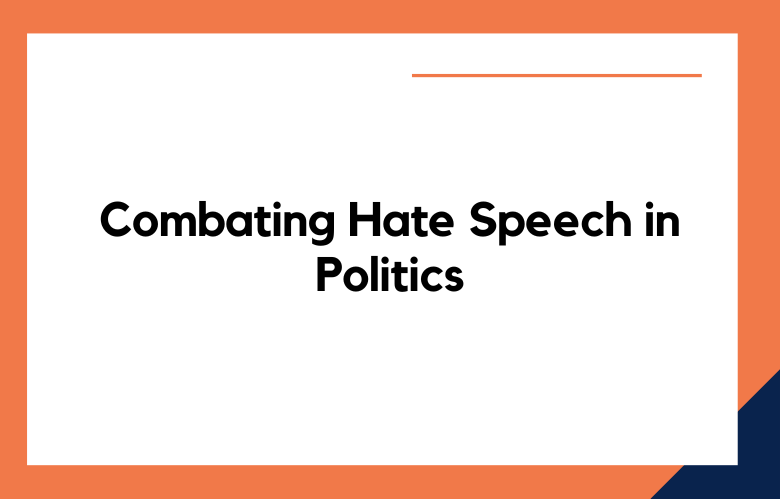Disinformation and hate speech have plagued the internet since its inception, but in recent years, they have risen to unprecedented levels. With the spread of social media, disinformation has become incredibly effective at influencing public opinion and even swaying elections.
Racist and bigoted speech hides behind anonymity, and extremist organizations can prey on disengaged youth. These dangerous trends put democracy at risk and threaten ideals like equality and justice.
The good news is that political parties have the power to make a difference. By taking proactive steps to combat disinformation and hate speech, political parties can safeguard their reputations, build stronger communities, and help protect democracy.
On the other hand, failure to act can exacerbate the problem and perpetuate the cycle of disinformation and hate speech.
What Political Party Should Combat Disinformation and Hate Speech?
Recently, disinformation and hate speech have become significant challenges for democratic societies worldwide.
Misinformation and hate speech can divide communities and even threaten national security. Therefore, political parties must take responsibility for combating such phenomena.
This leads us to the critical question: Which political party should combat disinformation and hate speech? In this blog post, we will explore the positions of different political parties on these issues.
Why Political Parties Should Combat Disinformation and Hate Speech
Political parties have a massive role in shaping their followers’ views and opinions. With this power comes the responsibility to ensure that the information being shared is correct and accurate.
Failure to do so can lead to the spread of harmful ideas that can negatively affect society. Political parties should be at the forefront of fighting against disinformation and hate speech online because it will ultimately help create a more informed and tolerant society.
The Role of Political Parties in Combating Disinformation and Hate Speech
Disinformation and hate speech have become increasingly severe problems in recent years, and political parties must play a role in addressing them.
However, figuring out which party best suits the task can be challenging. This blog explores the factors determining which political party is best equipped to fight disinformation and hate speech.
Adverse Effects of Disinformation and Hate Speech
Disinformation and hate speech can have a wide range of adverse effects on society. They can divide communities and cause distrust.
It can also spread fear and incite violence against marginalized groups. Furthermore, spreading disinformation can dampen the effectiveness of policies and public health measures.
In this regard, it is essential to recognize that political parties are necessary in combatting disinformation and hate speech on various fronts.
Ways on How to Combat Disinformation and Hate Speech
There are several ways that political parties can combat disinformation and hate speech effectively. One way is to promote media literacy and educate their followers on identifying credible sources of information.
Political parties can also work with social media platforms to remove fake news, disinformation, and hate speech from their platforms and hold their members accountable for spreading hate and disinformation.
Political parties should also be transparent in communication and promote democratic values such as critical thinking and respect for opposing views.
Building a More Informed and Tolerant Society
Political parties can build a more informed and tolerant society by combating disinformation and hate speech.
They can promote dialogue and peaceful discourse, inspire their followers to challenge their beliefs, and take responsibility for their actions. A more informed and tolerant society can help reduce social tensions and foster an environment where diversity and inclusivity are celebrated.
Types of Political Party Disinformation and Hate Speech
Utilize Trusted Fact-Checking Sources
Fact-checking sources, like Politifact or FactCheck, are an easy and reliable way of combating disinformation.
Political parties should partner with trusted fact-checking sources to debunk fake news and propaganda. By doing so, parties can eliminate the spread of lies and propaganda from their campaigns and, more importantly, ensure the public’s knowledge is well-informed.
Promote Transparency within the Party Machinery
Political parties must establish complete transparency within their operations. Transparency means the timeline, policies, procedures, and financial trail should be open to everyone.
The lack of such transparency can only lead to doubt regarding the parties’ motives.
This process should commence from the grassroots level, where parties should identify and track the money trail for every activity.
Encourage Constructive Communication
Social media platforms can become a breeding ground for hate speech and hostility.
Most of the ill-behaved comments come from anonymous profiles. Hence, parties should encourage members and followers to make constructive comments, especially when they disagree with their views.
Political parties should ensure that any harsh criticism, slanders, or attacks do not become a part of their campaign.
Train Supporters
Political parties play a significant role in defining the thought processes of their followers. They should provide training on how to avoid disinformation and hate speech when spreading the party’s word.
The training should include recognizing fake news, understanding basic journalistic norms, and a general guideline on what constitutes hate speech. Parties should also provide members with specific tools to counter the disinformation spread by other parties.
Involve Youth and Community Leaders
Young people are critically dependent on social media platforms; hence, they are the most vulnerable to misinformation and hate speech.
Political parties should work with community leaders to help them achieve a more nuanced understanding of social media and avoid its negative aspects.
Youth leaders may be appointed social media moderators to overlook the comments section or flag hate comments. By doing so, they can help steer conversations toward constructive and productive ways.
Conclusion
Disinformation and hate speech can have damaging, long-lasting effects that undermine democracy and human rights.
Political parties can mitigate these effects by investing in media literacy education, enforcing policies against hate speech, creating safe spaces for marginalized groups, promoting responsibility on social media, and working together to address the root causes of disinformation and hate speech.
By taking proactive steps against disinformation and hate speech, political parties can help protect democracy, promote justice, and support their communities.
How and Why Your Political Party should Combat Disinformation and Hate Speech: FAQs
What Is The Difference Between Disinformation And Hate Speech?
Disinformation is deliberately false or misleading information spread to deceive, while hate speech targets individuals or groups with abusive or discriminatory content.
Why Should Political Parties Address Disinformation Proactively?
Unchecked disinformation erodes public trust, misguides voters, destabilizes democracy, and damages the credibility of political institutions and candidates.
How Can A Political Party Monitor Disinformation Effectively?
By using AI tools, social media monitoring platforms, and fact-checking partnerships to track, analyze, and respond to false narratives in real-time.
What Are The Legal Implications Of Spreading Disinformation In Politics?
Depending on the country, legal consequences can include fines, bans, or criminal charges for spreading harmful or false political content.
How Does Disinformation Spread During Election Campaigns?
It often spreads through social media, anonymous websites, viral messaging apps, and bot networks targeting undecided or uninformed voters.
Can AI Be Used To Detect Hate Speech And Disinformation?
Yes. AI-powered content moderation tools can flag offensive language, detect misinformation patterns, and assist platforms in removing harmful content.
What Role Does Media Literacy Play In Combating Disinformation?
Educating the public about how to recognize fake news, verify sources, and question biased content is crucial for reducing the impact of misinformation.
How Can Political Parties Use Fact-Checking Strategically?
Parties can collaborate with third-party fact-checkers, publish timely rebuttals, and run public awareness campaigns that reinforce accurate information.
Are There Examples Of Successful Disinformation Mitigation In Politics?
Yes. Several European countries and campaigns have created war rooms and digital rapid-response teams to combat fake news during election periods.
What Policies Should Be In Place To Combat Hate Speech?
Clear codes of conduct, swift disciplinary action, and inclusive messaging policies should be enforced across party ranks and platforms.
How Can A Political Party Maintain Free Speech While Combating Hate?
By focusing on removing content that incites violence or discrimination, while allowing constructive debate and critical viewpoints within legal limits.
How Should A Political Party Respond To False Allegations Online?
With rapid clarification, legal notices if needed, and content correction supported by verified data and authoritative voices.
What Are The Risks Of Ignoring Disinformation And Hate Speech?
Potential outcomes include voter manipulation, public unrest, legal penalties, and long-term damage to a party’s brand and democratic reputation.
Can Grassroots Campaigns Help Counter Disinformation?
Yes. Mobilizing volunteers, influencers, and local leaders can amplify truth-based messaging and neutralize disinformation at the community level.
What Are Platform-Level Measures To Curb Disinformation?
Social media companies use content moderation, labeling, fact-checking partnerships, and algorithm changes to limit the reach of false information.
Should Political Leaders Be Trained In Responsible Digital Conduct?
Absolutely. Training ensures leaders avoid sharing misleading content and set an example of respectful and informed political dialogue.
What Are Ethical Guidelines For Political Communication?
Transparency, honesty, accountability, and a commitment to social cohesion are foundational principles for ethical political messaging.
How Can Data Analytics Support Disinformation Detection?
By identifying unusual spikes in engagement, suspicious sources, or coordinated bot activity that may signal a disinformation campaign.
How Important Is Cross-Party Collaboration In Fighting Disinformation?
Very. Bipartisan efforts strengthen democracy by promoting shared standards for truth and fairness across the political spectrum.
What Role Can Civil Society Play In Curbing Hate Speech?
NGOs, advocacy groups, and watchdogs can help raise awareness, support victims, and pressure platforms and politicians to uphold responsible communication standards.











